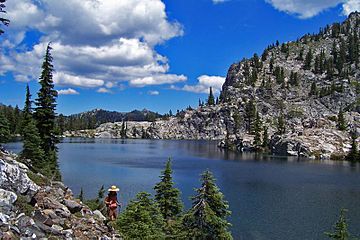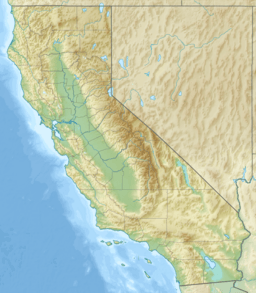Salmon Mountains facts for kids
Quick facts for kids Salmon Mountains |
|
|---|---|

Russian Lake and Russian Peak in the Salmon Mountains
|
|
| Highest point | |
| Elevation | 2,726 m (8,944 ft) |
| Geography | |
| Country | United States |
| State | California |
| Region | Shasta-Trinity National Forest & Six Rivers National Forest |
| District | Siskiyou County |
| Range coordinates | 41°12′N 123°13′W / 41.200°N 123.217°W |
| Topo map | USGS Thompson Peak |
The Salmon Mountains are a beautiful group of mountains located in northwestern California. They are part of a larger mountain system called the Klamath Mountains. You can find them in Siskiyou County.
These mountains are a special place, home to unique plants and animals. They also offer amazing views and outdoor adventures.
Contents
Exploring the Salmon Mountains' Location
The Salmon Mountains are a smaller part, or "subrange," of the Klamath Mountains System. This larger system is one of the many Pacific Coast Ranges that stretch along the western edge of North America.
National Forests and Nearby Areas
A big part of the Salmon Mountains is located within two important areas. These are the Shasta-Trinity National Forest and the Six Rivers National Forest. These forests help protect the natural beauty and wildlife of the region.
To the west of the mountains, you can find lands belonging to the Yurok and Hupa people. These are the Hoopa Valley Indian Reservation. Also, California State Route 299 runs along the southern side of the mountain range.
Discovering the Ecology of the Salmon Mountains
The Salmon Mountains are part of a special natural area called an ecoregion. This means they share similar plants, animals, and climate with other places nearby.
The Klamath-Siskiyou Forests Ecoregion
The Salmon Mountains are located within the Klamath-Siskiyou forests — Klamath Mountains ecoregion. This area is known for its amazing variety of plants and animals. It's part of a larger type of forest called a Temperate coniferous forests Biome.
Plant Life in the Mountains
The mountains are home to different groups of plants, known as plant communities. These communities grow together because they like similar conditions.
- California Mixed Evergreen Forest: This type of forest has a mix of trees that keep their leaves all year (evergreen) and some that lose them in the fall.
- Cedar Hemlock Douglas-Fir Forest: Here, you'll find tall trees like cedars, hemlocks, and Douglas firs. These forests are often very green and dense.
Images for kids



